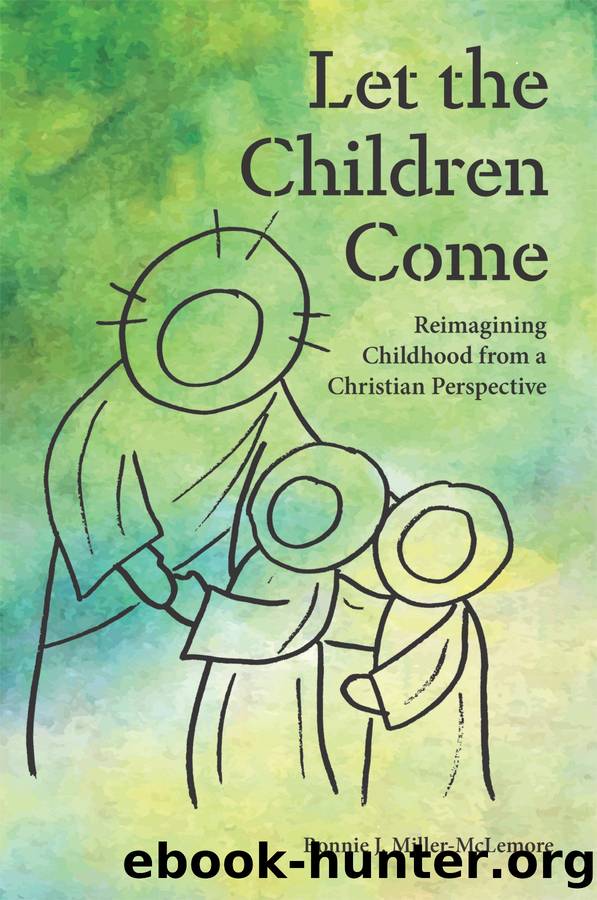Let the Children Come by Bonnie J. Miller-McLemore

Author:Bonnie J. Miller-McLemore [Miller-McLemore, Bonnie]
Language: eng
Format: epub
Publisher: Fortress Press
Published: 2019-01-25T00:00:00+00:00
Reclaiming Children as Gift and Task
The challenge today is to recapture the âradicalness,â as Gundry-Volf expresses it, of the gospel passages in which Jesus welcomes children. This requires change not only in adult attitude but also in childrenâs place within society. In Gundry-Volfâs words, âJesus did not just teach how to make an adult world kinder and more just for children; he taught the arrival of a social world in part defined by and organized around children.â
Christian views of children as divine gift challenge and even condemn some contemporary popular views and practices. Children, in essence, inherently question the whole economy of exchange that turns them into a commodity or even a nonentity. If children are gift, wholly unearned, they are ours âonly in trust,â as Whitmore asserts, coming from and ultimately returning to God. This limits adult power over them and forbids their use as a means to other ends.
Equally important, children are not pure gifts with no strings attached. From the adults around them, children require in return unearned âgifting,â without which they will not survive, demanded simply because of what children are in and of themselves. A genuine gift creates an ongoing relationship because a gift leaves a disequilibrium that suggests the hope that sharing gifts will continue ad infinitum. Market exchange, by contrast, rigidifies relationships. It aims at an equilibrium in which exchanging money for a product ends the relationship.
Most people who toss around the idea of children as gift know neither the Christian imperatives attached to the claim nor how later Christian history developed them. John Calvin in particular stands out as a sixteenth-century theologian who especially loved the language of children as Godâs gift and understood the dialectic between gift and task, or the need for a return gifting. This is not so surprising since he saw Scripture as a central source of divine truth. If he promotes the theme, it is partly because the Biblical narratives suggest it to him. The idea of children as gift also results from the deep appreciation for divine providence, or Godâs oversight of human destiny, through which he filters his entire theology. In declaring the fruits of Godâs purposeful beneficence, he underscores again and again that children are a special blessing.
His commentaries on the stories of barrenness and procreation in Genesis and on references to children in the Psalms are wonderfully illustrative. Speaking about the conception of Isaac, Calvin declares that every birth is like a visit from God. Lifting up the man with many sons who is likened to the happy warrior with a quiver full of arrows in Psalm 127, he repeats a favored phrase of his: the fruit of the womb is Godâs gift. This phrase, in fact, echoes Elizabethâs greeting of her pregnant kinswoman Mary in Luke 1:42. Calvin departs significantly from other theologians, such as Augustine and Luther, in his reading of the reference in Psalm 8 to âthe mouths of babes and infantsâ singing Godâs praises. This does not refer allegorically to those young in faith.
Download
This site does not store any files on its server. We only index and link to content provided by other sites. Please contact the content providers to delete copyright contents if any and email us, we'll remove relevant links or contents immediately.
Machine Learning at Scale with H2O by Gregory Keys | David Whiting(4292)
Never by Ken Follett(3937)
Fairy Tale by Stephen King(3370)
Reminders of Him: A Novel by Colleen Hoover(3092)
The Man Who Died Twice by Richard Osman(3072)
Will by Will Smith(2907)
Rationality by Steven Pinker(2352)
It Starts With Us (It Ends with Us #2) by Colleen Hoover(2340)
Can't Hurt Me: Master Your Mind and Defy the Odds - Clean Edition by David Goggins(2323)
Friends, Lovers, and the Big Terrible Thing by Matthew Perry(2219)
The Becoming by Nora Roberts(2188)
The Stranger in the Lifeboat by Mitch Albom(2113)
Love on the Brain by Ali Hazelwood(2059)
New Morning Mercies: A Daily Gospel Devotional by Paul David Tripp(1915)
A Short History of War by Jeremy Black(1842)
The Strength In Our Scars by Bianca Sparacino(1840)
HBR's 10 Must Reads 2022 by Harvard Business Review(1839)
A Game of Thrones (The Illustrated Edition) by George R. R. Martin(1721)
Never Finished: Unshackle Your Mind and Win the War Within by David Goggins(1703)
